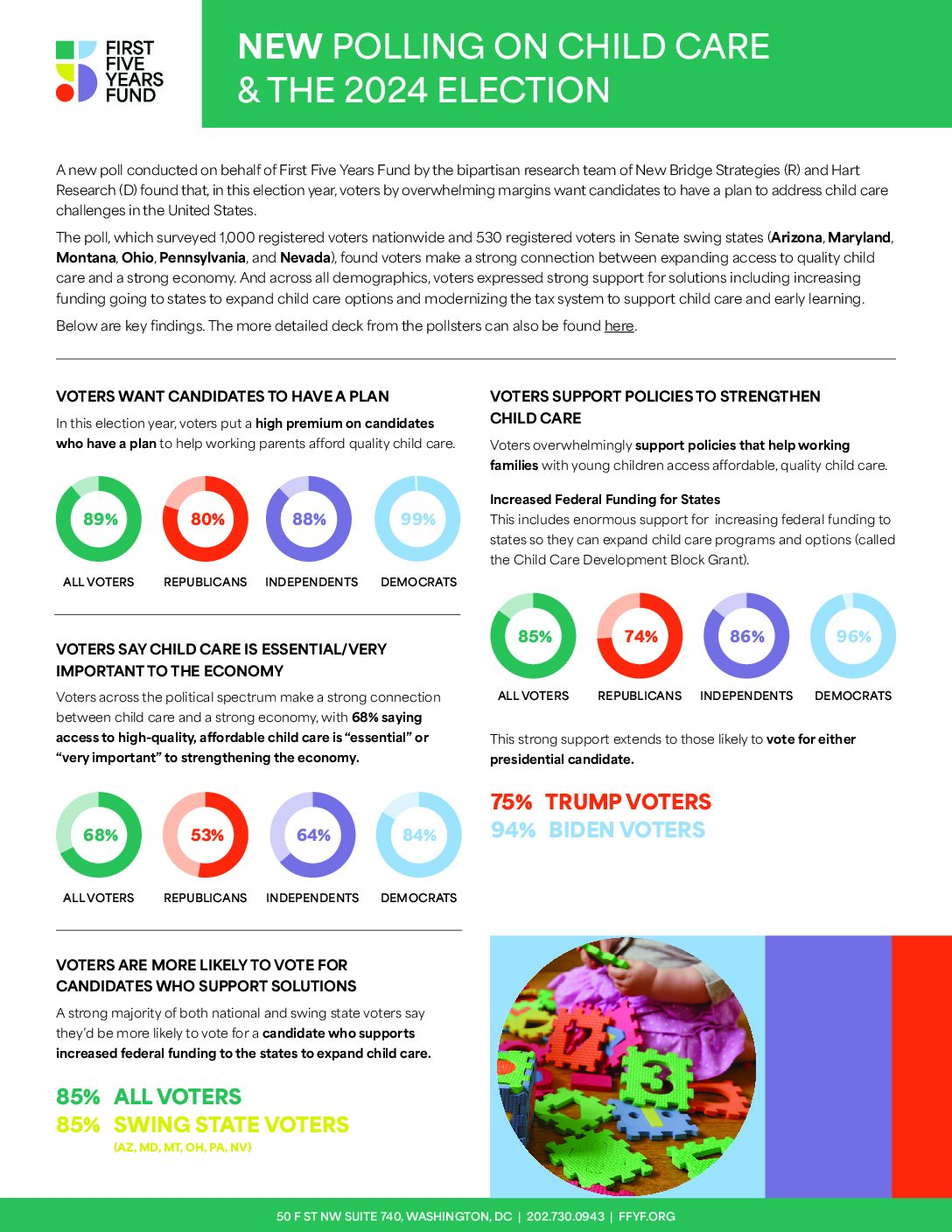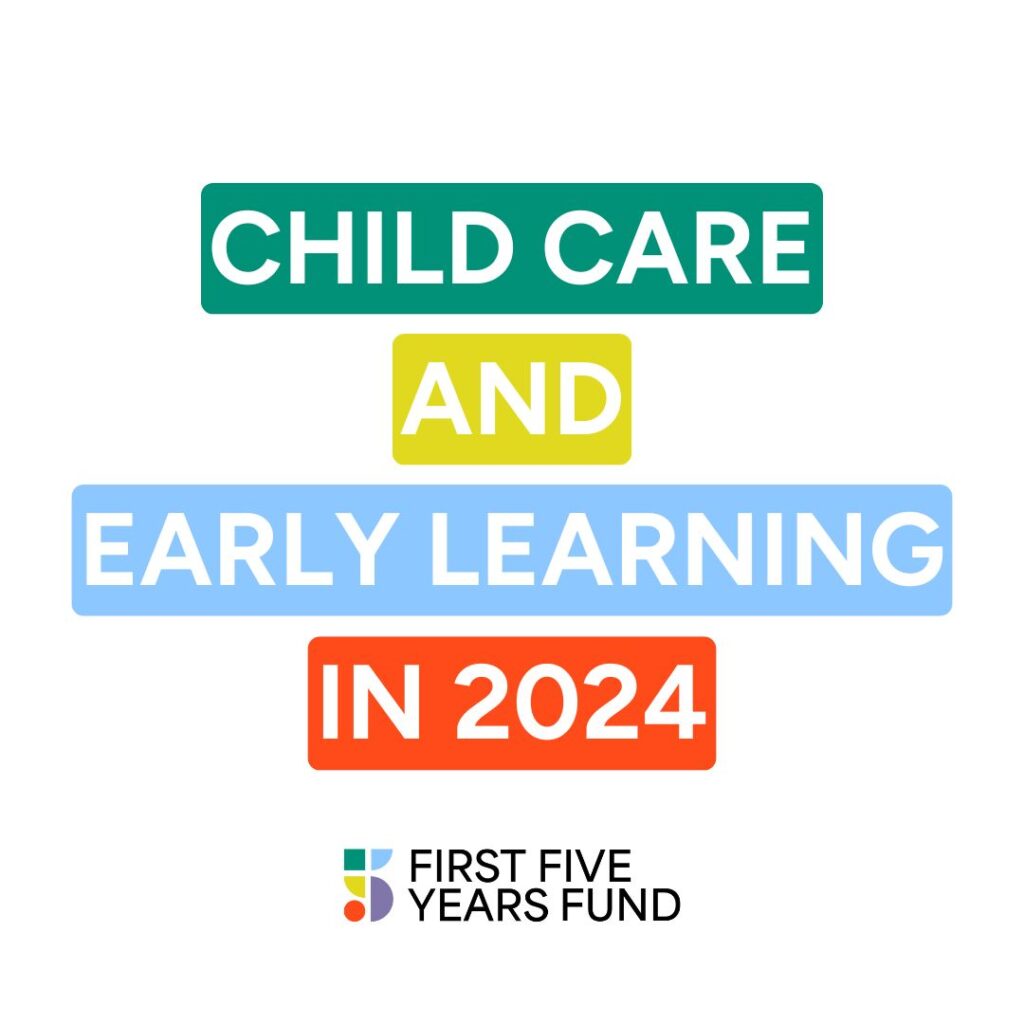New Polling on Child Care and the 2024 Election

A new poll conducted on behalf of First Five Years Fund by the bipartisan research team of New Bridge Strategies (R) and Hart Research (D) found that, in this election year, voters by overwhelming margins want candidates to have a plan to address child care challenges in the United States.
The poll, which surveyed registered voters nationwide and registered voters in battleground Senate states (Arizona, Maryland, Montana, Ohio, Pennsylvania, and Nevada), also found voters make a strong connection between expanding access to quality child care and a strong economy. And across all demographics, voters expressed strong support for solutions including increasing funding going to states to expand child care options and modernizing the tax system to support child care and early learning. Below are key findings, a one pager, and a deck from the pollsters.
“This poll clearly demonstrates that not only do voters want Congress to do more to address child care challenges today; they also want future lawmakers to have a plan for addressing child care challenges tomorrow.
Voters understand the strain that finding and affording care has on families. They also understand the direct connection child care challenges has on the economy and the benefit that quality care has on our little ones. Now the message to candidates is unequivocal – let’s move beyond defining the problem and get to work enacting tangible, common-sense policies.
Actions like improving child care tax credits and increasing federal child care funding for states are incredibly popular. Current lawmakers and candidates on the campaign trail have the opportunity now to leverage this clear bipartisan support to bring much-needed assistance to working families with young children.“
– Sarah Rittling, First Five Years Fund Executive Director
VOTERS WANT CANDIDATES TO HAVE A PLAN
In this election year, an overwhelming majority of voters (89%) want candidates to have a plan or policies ready to help working parents afford high-quality child care. This cuts across party lines, with 80% of Republicans, 88% of Independents, and 99% of Democrats.

2024 LOOK: 82% of Trump voters and 96% of Biden voters want candidates to have a plan or policies ready to help working parents afford high-quality child care.
VOTERS SAY CHILD CARE IS ESSENTIAL/VERY IMPORTANT TO THE ECONOMY
Voters make a strong connection between child care and a strong economy, with 68% of all voters saying access to high-quality, affordable child care is “essential/very important” to strengthening the economy. This includes 53% of Republicans, 64% of Independents, and 84% of Democrats.

AND THEY’RE THINKING ABOUT THIS GOING INTO THE 2024 ELECTIONS
Voters are more likely to support candidates who support child care solutions. A strong majority of both national and swing state voters say they’d be more likely to vote for a candidate who supports increased federal funding to the states (also known as the Child Care Development Block Grant, or CCDBG) to expand child care. This includes:
- 85% of all voters, including 73% of Trump voters and 95% of Biden voters.
- And over four-fifths of voters (85%) in states that will be critical to the makeup of the United States Senate – Arizona, Maryland, Montana, Ohio, Pennsylvania, Nevada.
VOTERS WANT CHILD CARE SOLUTIONS
Voters overwhelmingly support policies that help working families with young children access child care. This includes strong support for increased federal funding provided to states to expand their existing child care programs as well as expanding federal tax benefits to both families and employers.
Expanding Existing Child Care Programs Like Child Care Development Block Grant (CCDBG): An overwhelming majority of voters (85%) support increasing federal funding to the states which allows them to expand their child care programs (known as CCDBG). This includes 74% of Republicans, 86% of Independents, and 96% of Democrats.

Increasing the Federal Child Care Tax Credit (Child and Dependent Care Tax Credit, or CDCTC): A large majority of voters (76%) support increasing the federal child care tax credit (CDCTC), the only existing tax credit specifically designed to help ease the burden of child care costs for working families. This includes 62% of Republicans, 74% of Independents, and 92% of Democrats.

CONCERNS OVER CHILD CARE REMAIN HIGH POST PANDEMIC
Contrary to the narrative that child care concerns and struggles peaked during the pandemic, voters remain as concerned about child care today as they were at the height of the pandemic.
- 2024: 54% of voters say Congress and the White House should make expanding access to quality child care a top or high priority.
- 2020: 51% say Congress and the White House should make expanding access to quality child care a top or high priority.
Subscribe to FFYF First Look
Every morning, FFYF reports on the latest child care & early learning news from across the country. Subscribe and take 5 minutes to know what's happening in early childhood education.




